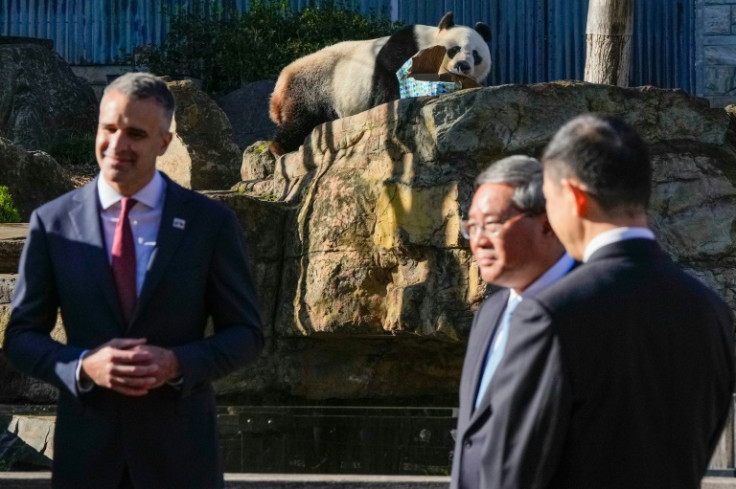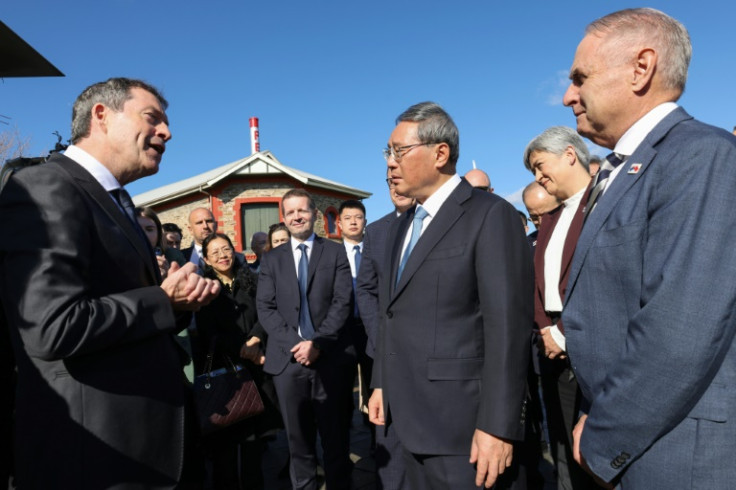
Chinese Premier Li Qiang will receive a grand ceremonial welcome at Australia's parliament on Monday, the prelude to thorny talks expected to raise recent military confrontations and rising regional tensions.
Australian police have beefed up security measures in a bid to head off trouble outside, fearing the potential for ugly clashes between pro-China groups and human rights protesters.
The highest-ranking Chinese official to visit since 2017, Li has used the trip to highlight trade, friendship and China's love for Australian products like red wine.
But Australian Prime Minister Anthony Albanese has pledged to broach far trickier points of geopolitical tension and "national interest" when they meet behind closed doors in Canberra on Monday.
One of the most pressing issues in Australia's eyes is the plight of jailed dissident writer Yang Hengjun.
A dual Chinese-Australian citizen, Yang was handed a suspended death sentence in February this year after a Beijing court found him guilty on espionage charges seen by many as politically motivated.
Australia has also chastised China's military in recent months for its "unacceptable" and "unsafe" behaviour in international skies and waters, and has urged restraint in the South China Sea.
Despite these grievances, University of Sydney researcher Minglu Chen said Australia would be careful to smooth over public criticisms of its largest trading partner.
"I don't know if all the problems on the security side will just disappear overnight," she told AFP.
"But I think this visit still has a symbolic meaning. Which is sending a good gesture, and for China to show the outside world it is still willing to embrace foreign countries."
Ahead of Li's visit to the capital, police warned that "protest activity" was expected on the manicured lawns outside parliament.
Metal crowd barriers were erected in an effort to limit skirmishes between China supporters and human rights protesters.
A small group of demonstrators clashed with police when foreign minister Wang Yi came to Canberra in March, brandishing Tibetan flags and chanting "Free Tibet" outside the Chinese embassy.
While regional security is likely to remain a sore point between Canberra and Beijing, relations are far warmer when it comes to trade.
"Mutual respect, seeking common ground while shelving differences and mutually beneficial cooperation" are key to the relationship, Li said at the outset of his Australian tour.
In the depths of a bitter dispute in 2020, China slapped trade barriers worth billions of dollars on Australian coal, timber, wine, barley, beef and rock lobster.
Most of these trade bars have since been dismantled.
"I think this is really an important signifier that China and Australia's relationship has moved away from its historical low," said Chen.
"It's moving towards a more positive direction."
Li is nearing the end of a six-day tour of New Zealand and Australia.
He spent Sunday in the state of South Australia, viewing the pandas at Adelaide Zoo and lunching at a historic vineyard on the outskirts of the city that had been hit by China's sanctions.
Li announced China would loan new "adorable" giant pandas to replace popular pair Wang Wang and Fu Ni at Adelaide Zoo.
The longstanding Adelaide pandas, which have failed to produce offspring since their arrival in 2009, will return to China by the end of the year.
"I guess they must have missed their home a lot," the Chinese premier said.









